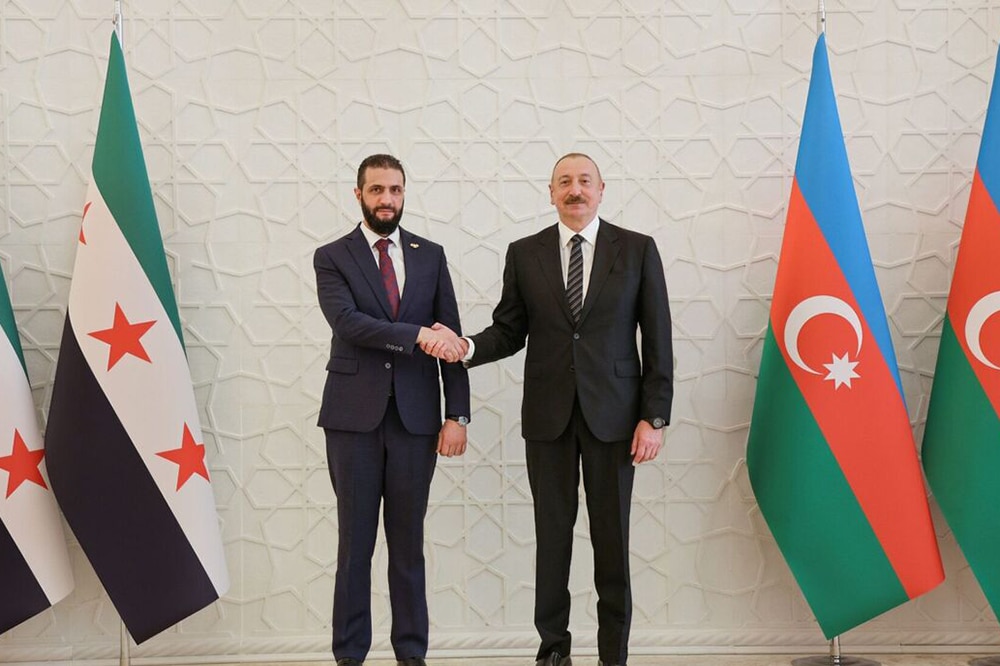Jolani in Baku, a new map for the region.
Ahmed al-Shara, nicknamed Abu Muhammad al-Julani, the leader of the terrorist group Hayat Tahrir al-Sham and the ruler of Syria, met with Ilham Aliyev, the country’s President-for-Life, in Baku, the capital of Azerbaijan, yesterday (Saturday, July 12, 2025). The meeting was held at the invitation of the Azerbaijani side to negotiate the provision of gas assistance to Damascus. However, in addition to the announced contents, this trip probably has important unannounced parts. In recent months, officials of the Golani government have held many meetings and talks in various formats to normalize relations with the Zionist regime, and Azerbaijan, along with the Emirates, has done the most activities in this regard.
Notes
The meeting between the rulers of Syria and Azerbaijan contains points, some of which require understanding from certain angles. An attempt has been made in this section to examine these matters.
1- Balancing between the Arab Front and the Turkish Front
In the group of friends of the Golani, which includes Turkey and the southern Gulf states, from the Turkish side, Azerbaijan, and the southern Gulf states, the UAE is closer to the Zionist regime and has broader relations. The relations of these two countries with the Zionist regime have more military, security, and economic dimensions than others. On the one hand, Golani wants to use mediators to normalize relations with the Zionist regime, and on the other hand, it is probably seeking to balance the different factions; if the UAE is acting on behalf of the Arab states, Azerbaijan has also been proposed on the Turkish side.
2- Azerbaijan is a lesser ally in foreign policy
With the failure of Turkey’s plans in West Asia in the late 2020s, which resulted in the stability of the Syrian regime, the fall of Mohamed Morsi in Egypt, and the fragmentation of Libya, this country became more inclined towards Azerbaijan. There were reasons for this. First, unlike political parties and paramilitary groups, Azerbaijan was a state and a country that enjoyed certain advantages, including the possibility of diplomatic mobility. The second was related to its financial independence. The relationship and alliance with Azerbaijan not only did not require financial assistance but were also profitable. The third issue was related to its stability, which had shown its sustainability since the 1990s. Azerbaijan fulfilled Erdogan’s unfulfilled aspirations in West Asia, which included energy and goods transit. Accordingly, Azerbaijan became a pillar in Ankara’s foreign policy, as manifested in its presence in Turkey-Pakistan cooperation and its transformation from bilateral to trilateral cooperation, the outbreak of the 2020 Caucasus War, and the attempt to occupy southern Armenia. Turkey has Azerbaijan as a junior partner in every game and coalition. The Syrian case is no exception to this, because the first signs of the connection between Azerbaijan and Syria were revealed in the 2020 war and the transfer of some Takfiri elements from this country to Karabakh.
3. Acceptability of Azerbaijan in the eyes of the Zionist regime
The large countries of the region are not very favorable to Tel Aviv due to their power dimensions and the inevitable friction of interests with other actors, including the Zionist regime. Iran, Turkey, and Saudi Arabia have different policies towards the Zionist regime, but even the softest view is challenged by this entity. The Zionist regime is seriously opposed to the plan to sell F-35s to Turkey and the Saudi nuclear program. In the Islamic world and the region, however, there is no country for the Zionists like Azerbaijan. Regional powers such as Iran, Turkey, Saudi Arabia, and Egypt conflict with the Zionist regime. Other small states in the region are also under the influence of one or more regional powers and are unable to operate independently of them. Another group of countries has sufficient independence, but internal political currents and public pressure prevent them from cooperating with the Zionist regime. Azerbaijan, however, is not one of them; it is neither a great power that would have a conflict of interests with the Zionist regime, nor is it under the banner of one of the regional powers, nor has the government’s repression allowed it to influence public opinion.

